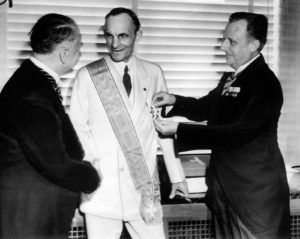1938 Henry Ford’s Antisemitism – Business Week Online
 “On the occasion of his 75th birthday, in 1938, Henry Ford received a medal, the Grand Service Cross of the supreme order of the German eagle, from Adolf Hitler. Such was Hitler’s regard for the carmaker that at one time he kept a portrait of ford in his office and expressed his admiration in the second volume of Mein kampf. Some of this sentiment had to do with ford’s automotive achievements, which the fuhrer mimicked with a grand plan for German motorways filled with “people’s cars–inspired by the American model.” but autos aside, the two men also shared an idée fixe: that Jews were responsible for the evils of the world.
“On the occasion of his 75th birthday, in 1938, Henry Ford received a medal, the Grand Service Cross of the supreme order of the German eagle, from Adolf Hitler. Such was Hitler’s regard for the carmaker that at one time he kept a portrait of ford in his office and expressed his admiration in the second volume of Mein kampf. Some of this sentiment had to do with ford’s automotive achievements, which the fuhrer mimicked with a grand plan for German motorways filled with “people’s cars–inspired by the American model.” but autos aside, the two men also shared an idée fixe: that Jews were responsible for the evils of the world.
For much of the 20th century, Henry ford was America’s most notorious anti-Semite–something that’s largely forgotten today. Neil Baldwin, Executive Director of the National Book Foundation and author of Edison: inventing the century, redresses that with Henry Ford and the Jews: the mass production of hate.
Ford wasn’t alone in being biased, of course. Baldwin shows that anti-Jewish attitudes were common in Ford’s “tightly circumscribed world of post-bellum Midwestern America.”
But Ford took anti-Semitism a step further than most of his contemporaries by personally stoking a powerful propaganda campaign. His chief instrument was the Dearborn independent, an obscure Michigan weekly that Ford built into a national presence beginning in 1919.
Ford’s campaign had an unintended consequence. It galvanized an Anti-Ford movement among Jewish leaders–including Louis Marshall, a lawyer and President of the American Jewish Committee–who were already beginning to organize around such matters as war relief.
And Ford’s anti-Semitic campaign had left him isolated and under fire. Most important, he was hit with a $1 million libel suit by agribusiness executive Aaron Sapiro, whom Ford had characterized as part of a malign, international Jewish cabal.
Ford issued a public apology for his anti-Semitic words and settled the Sapiro lawsuit. The newspaper then ceased publication.
The apology didn’t signify a change in attitude. Ford’s private notebooks show that he continued to view Jews as part of an anti-Ford Motor Co. conspiracy, involving “financiers,” the New Deal, labor unions, and his major auto competitors.
Source: Business week online 1/21/2002



